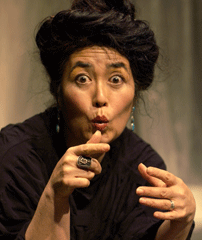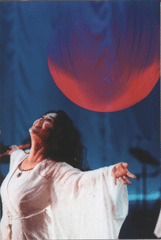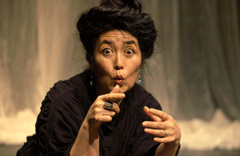Inside Grandpa's Shack
Air Date: Week of January 1, 2010

Hear true tales from where East meets West as Living on Earth presents its holiday special featuring Asian-American storytellers. Artist Brenda Wong Aoki tells the story of how she bonded with her Chinese grandfather-- a Monterey seaweed gatherer-- over pickled chickens feet and tide pools.
Transcript
ANNOUNCER: Support for Living on Earth comes from the National Science Foundation and Stonyfield Farm.
[MUSIC: "Stick Song," Mark Izu: www.markizu.com]
CURWOOD: From the Jennifer and Ted Stanley Studios in Somerville, Massachusetts, this is Living on Earth. I’m Steve Curwood.
The days have grown short and cold, the nights long and dark. In the northern hemisphere, we’re not so far from that shortest day of the year. It’s time to put our daily duties aside to gather with family and friends. And here at Living on Earth, it's time for us to put our coverage of environmental news on the back burner to fire up some fresh storytelling.
This year for our winter storytelling special, we turn to the East. Three Asian-American artists bring us their true tales of tough times, triumph, and cultural tightrope walking.
So first, we'd like to welcome Tou Ger Xiong, a Hmong-American storyteller, hip-hop artist, and comedian. He tells us the tale of his journey from the hot jungles of Laos to the cold winters of Minnesota. Welcome, Tou Ger.
XIONG: Hi Steve, thanks for having me.
CURWOOD: Also with us is stage artist and writer Brenda Wong Aoki. She brings us a story of how she bonded with her grandfather—over pickled chicken’s feet and blankets of seaweed. Hello, Brenda.
WONG AOKI: Hi, thanks for having me here.
CURWOOD: And storyteller Megumi tells us about one man’s life growing up in a Japanese-American internment camp in World War Two, and how his cartoons gave voice to an imprisoned community. Megumi, thanks for joining us.
MEGUMI: Thank you for having me here.
CURWOOD: So Brenda, let’s start with you. What kind of memories does this time of year bring up for you?
WONG AOKI: Well, it reminds me of when I was a girl. I have four sisters and a brother and my mom and my dad. And it reminds me of wearing matching dresses. My mom used to make all of her own clothes. And she’d make ’em out of the same bolt. And she really liked polka dots. So she’d make five little polka dotted dresses for me and my sisters.
[LAUGHING]
WONG AOKI: And my brother and my dad would have shirts to match and every time we’d go out, like, you know, to a busy place like downtown or something we’d be wearing these matching polka dot clothes so in case any of us got lost somebody would find us and bring ‘em back.
[LAUGHING]
WONG AOKI: …that was our holiday attire.
CURWOOD: A holiday attire! Of course, this time of year, what kind of food would your family make?
WONG AOKI: Tomato beef chow mein with crispy noodles, and it was our favorite thing at Christmas time, and we always make jook after a big holiday. If your mom’s Chinese, that’s what you have.
CURWOOD: Jook? What’s jook?
WONG AOKI: Jook is this rice gruel soup. It’s like a gumbo.
CURWOOD: A gumbo.
WONG AOKI: Because you keep – yeah – it’s just plain and then you just keep adding stuff to it. You just throw stuff in.
CURWOOD: Sounds good. I’m getting hungry already.
WONG AOKI: It’s good.
CURWOOD: Now your mom was raised in an orphanage in the San Francisco area as I understand it, but your mom has always had a relationship with her father despite not growing up with him. Could you tell us a story about your relationship with your grandfather?

Storyteller Brenda Wong Aoki.
Inside his shack there were these frogs, big as your head, ribbit-ing in the sink. Ribbit. Ribbit. Ribbit. I handed my grandpa a bunch of flowers my mother has given me. (Laughs) “Momma, he won’t take it.” (Laughs) As it turns out, that to some old fashioned Chinese, cut flowers, they’re an omen of death. Grandpa thought I wanted to kill him or something. (Speaking in angry Chinese) … “Stupid Bamboo Head!” (Crying sounds) That night we all laid down on blankets of seaweed. Seaweed – because that’s what my grandpa did, he gathered seaweed off the rocks and he sold them to people in Chinatown, marked “fresh from Hong Kong.” So we slept on that seaweed as it was drying. It was so dark in there, you couldn’t see your hand in front of your face. And I remember, “Momma? I gotta go to the bathroom.” Mom handed me this metal pail. “What’s this for?” “You know.” “You mean…?” “Uh huh, We call it a thunder bucket.” (Nervous laughter)
[MUSIC: "Longing For Home" Mark Izu: www.markizu.com]
WONG AOKI: And that’s what I remember from my first trip to Grandpa’s. We returned to Grandpa’s when I was about eleven. That summer I found myself wearing men’s galoshes, Grandpa’s overalls and this big Coolie hat. I looked totally F-O-B. man, fresh off the boat. This was not my idea of a nice summer. I was gonna be home in L.A. in a bikini, body surfing with my friends, listening to my transistor radio, and here I was looking like an F-O-B. in this big old silly hat, helping Grandpa.
At three or four in the morning, whatever time the time the tide was low, his little green flashlight leading the way, we’d climb down the cliffs on these little teeny steps my grandpa had hewn from the rock. I was slipping and sliding, trying my best to keep up with Grandpa’s short stocky legs. When we got down there, all around us were tide pools. Tide pools like you can’t see anymore. Tide pools with pink and green sea anemones, orange starfish, little baby octopus, shells, golden light. They’re just beautiful. But Grandpa would say “(speaking Chinese) … Hurry up!” Twist and pull and throw in the basket. We gathered seaweed. Twist and pull and throw in the basket. The barnacles were really bad on your nails. Twist and pull and throw in the basket. Twist and pull and throw in the basket. I do not want to be here. Twist and pull and throw in the basket. Twist and pull and … watch wave? What do you mean, Grandpa. watch-- waaaaave! Whoa! This was dangerous work. One false step and Mother Ocean ate you up.
At sunset, Grandpa would gather those wet baskets of seaweed, put ’em on this long bamboo pole. You know he had this groove in his shoulder that that pole fit perfectly in, sort of like a puzzle piece. We get back to his shack. He’d light a fire in the stove, shoo the frogs out of the sink - 'Go now, go. Gooooo.' Take a great big wok and make dinner. Ssshhhhhhh. Sometimes on special occasions, Grandpa would bring out a Chinese delicacy – pickled chicken feet. Little toe nails clicking, he’d walk them across the table towards me. [Shrieks.] He loved to do that. (Laughing) 'Heh, heh, heh, heh, heh.'
After supper, Grandpa would take 180 proof Chinese whiskey, pour it in a tea cup, and in another he’d pour me tea. He’d say 'This for me. This for company.' He’d light a big stogie…[Sound of lighting and inhaling]…look me in the eye and say…[Sound of exhaling] …'Blenda. Blenda. Blenda, how’s skoo.' Brenda, how's school-- that was Grandpa’s favorite American line. Brenda, how’s school? ’Cause you see in Chinese words take on different meanings if you change the intonation. So Grandpa would change his tones and thing he was saying a whole bunch of American words. Our conversation use to go something like this:
'Blenda, how’s skoo?'
'Grandpa, tide pools are cool.'
(different intonation) 'A Blenda, how’s skoo?'
'Tomorrow, can we take a day off?'
(different intonation) 'Blenda, how’s skoo?'
We used to talk like that for hours. At the end of the summer, Grandpa poured gasoline on the rocks and torched them. He said you had to do that so that the new seaweed could grow. All night we watched the flames on the waves. The next day when my parents picked me up, I gave Grandpa a big kiss on his bald head right between those two floppy ears. And he said to me 'You go now. Go. Goooo' And he stood there with that little green flashlight, and I swear that beam never wavered until he got all the way up the mountain and dropped over the crest.

Brenda Wong Aoki
[MUSIC: "Processional From Kuan Yin, The One Who Sees The Cries Of The Universe," Mark Izu: www.markizu.com]
CURWOOD: Now, your mom has roots in China and your dad has roots in Japan?
WONG AOKI: Yeah, we’re [foreign phrase].
CURWOOD: uhhhh….?
WONG AOKI: Chinese, Japanese, Spanish actually and Scots Irish.
CURWOOD: Okay. So what was it like growing up with such a unique background?
WONG AOKI: It was great. I just thought the whole world was like that.
[LAUGHING]
WONG AOKI: I grew up on a naval base. I thought we were all like this.
CURWOOD: Naval base where?
WONG AOKI: Long Beach.
CURWOOD: And then I understand, what you moved to the Bay Area?
WONG AOKI: Uh huh.
CURWOOD: And there – and there you learned a lot more about your family I imagine.
WONG AOKI: It was a big surprised to me, but my grand uncle was probably the first Japanese to marry a Caucasian person. He ran away with the daughter of the archdeacon of Grace Cathedral in 1909. Right next to Chinatown, there in San Francisco.
WONG AOKI: Yeah. And that was our literal fall from grace, because after that our family was looked down miscegeny laws any things.
CURWOOD: What happened to this white woman?
WONG AOKI: Well, gosh, she was amazing. She fled with her children into the Sierra foothills during the internment. Her daughter said 'Momma knew those camps' - you know, talking about the internment camps - 'Momma knew those camps weren’t gonna be no picnic.' So they went up into the Sierra foothills and passed the kids off as Indians.
[MUSIC: "Into The Valley," Mark Izu: www.markizu.com]
CURWOOD: We’re dishing up Asian-American stories for our holiday season program today, and there’s plenty more to come. Keep listening to Living on Earth.
Links
Living on Earth wants to hear from you!
Living on Earth
62 Calef Highway, Suite 212
Lee, NH 03861
Telephone: 617-287-4121
E-mail: comments@loe.org
Newsletter [Click here]
Donate to Living on Earth!
Living on Earth is an independent media program and relies entirely on contributions from listeners and institutions supporting public service. Please donate now to preserve an independent environmental voice.
NewsletterLiving on Earth offers a weekly delivery of the show's rundown to your mailbox. Sign up for our newsletter today!
 Sailors For The Sea: Be the change you want to sea.
Sailors For The Sea: Be the change you want to sea.
 The Grantham Foundation for the Protection of the Environment: Committed to protecting and improving the health of the global environment.
The Grantham Foundation for the Protection of the Environment: Committed to protecting and improving the health of the global environment.
 Contribute to Living on Earth and receive, as our gift to you, an archival print of one of Mark Seth Lender's extraordinary wildlife photographs. Follow the link to see Mark's current collection of photographs.
Contribute to Living on Earth and receive, as our gift to you, an archival print of one of Mark Seth Lender's extraordinary wildlife photographs. Follow the link to see Mark's current collection of photographs.
 Buy a signed copy of Mark Seth Lender's book Smeagull the Seagull & support Living on Earth
Buy a signed copy of Mark Seth Lender's book Smeagull the Seagull & support Living on Earth

